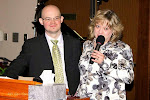Over the past several years, Psalm 119 has become one of my favorite chapters of the book of Psalms. I learned to read it through in Hebrew and have read it through in Hebrew more than a hundred times, probably. I have yet to commit it to memory in Hebrew, however, I have been able to translate it using a number of different sources, including other Jewish and English translations.
In Hebrew, the Psalm is written as an acrostic poem -- the first letter of each verse begins with the letter of the Hebrew Aleph-Bet (alphabet). Only, Psalm 119 assigns 8 verses to each letter. For instance it would be like this if were an English poem with eight lines beginning with A and so forth:
All God's children love God and each other.
Better a friend nearby than a far-away brother.
Christ is the answer and not another.
Also, another interesting find about this Psalm is that every verse uses a synonym for God's Word, i.e. Commandments, statutes, laws, precepts, Word, testimonies. There are only two exceptions to this: verses 37, 90.
I have always struggled with this Psalm because of the use of the legalistic words. The Jewish sages have discouraged non-Jews from reading this Psalm, as they believe it "damages the soul" (Maimonides). However, after reading through this Psalm so many times, I began to see it as a pathway or journey. King David often used terms about a Pathway or roads in reference to God. In fact, the relationship between God and His servants was often referred to as "walking with God." You can refer to earlier posts that I made on this subject.
The words used began to make since for me. For instance, instead of Commandments, I saw the word as Directions, or signposts along the way. I saw the statues as guardrails and precepts as the posted speed-limits which are all for our safety. When I lived in Jerusalem many years ago, I learned the phrase, "Yesh Tor". In modern Hebrew, this means, "There is a line." The reason I had to learn it is, people would attempt to "Jump the cue" or "break in line" and this would be the phrase to let them know they had to "get in line". I have heard many different definitions for the Hebrew word TORAH which is often translated law, teaching, instructions, etc. But the Word "Line" fits my vocabulary best. One can understand this word picture as shooting an arrow. The direct LINE the arrow goes from the bow to the target is TORAH. And when one sins, the definition for sin is "missing the mark".
\......... ______________/_____________
The Torah is the straight line in the previous diagram is the pathway that
leads to life. The broken line is the way of evil, lying and falsehood.
In the following post, I will share my translation of Psalm 119. Here is a list of words that I have translated from the original Hebrew:
Commandments: DIRECTIONS
Statutes: BOUNDARIES
Law: LINE
Precepts: CHARGES
Testimonies: EYE-WITNESS REPORT/ACCOUNT or EVIDENCE
Judgements: DECISIONS or SENTENCES
Righteous/ness: JUSTICE or RIGHT


No comments:
Post a Comment